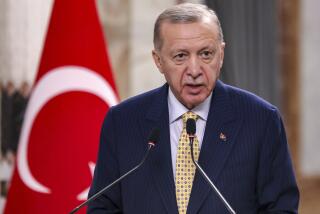A Burgeoning Partnership : Russia’s enrolling in new group could open door to gains in international security
- Share via
Russia has told NATO that it’s now ready to join the 18 other countries, including former republics of the Soviet Union, that have accepted the West’s invitation to enroll in a new Partnership for Peace. Moreover, Defense Minister Pavel Grachev told his counterparts from 16 NATO nations the other day, Russia is ready to sign on--maybe as early as next month--without the conditions it earlier indicated it would demand.
NATO has politely welcomed Moscow’s decision. Better, after all, to be on a friendly consultative footing with the country whose territorial expansionism NATO was originally formed to resist than to continue treating that country like a mistrusted outsider. It’s clear nonetheless that within NATO strong doubts about Russia’s aims remain, and that a healthy caution is likely to guide the West’s approach to developing closer military ties with Moscow.
The Partnership for Peace (PfP) is an idea hastily thrown together in Washington earlier this year to fend off those former members of the Warsaw Pact--Poland, Hungary and the Czech Republic, most prominently--that were rapping on NATO’s door in quest of membership. Their reason was the honorable one of self-preservation. All had sound historical reasons to fear Russia and, if less so now, Germany, and membership in NATO would provide a larger measure of collective security than any had ever known.
However, at a time when ultranationalists had just scored big in Russia’s parliamentary elections, the consensus in Western capitals was that this wasn’t the most opportune time to begin extending NATO’s flank eastward, to the very borders of the former Soviet Union. Instead there would be the PfP, which would forge military links between old antagonists by means of joint military exercises, defense planning and maybe peacekeeping missions.
Russia’s readiness to join the PfP unconditionally does, however, carry an asterisk. Grachev made clear that Russia remains the superpower in Europe and expects to be treated with the respect that status implies, and not simply as just one state among many. He also made clear that Russia regards the PfP as only a way station to a new “collective security system in Europe” in which NATO would play a subordinate role.
Most NATO countries are in any case plainly unenthusiastic about admitting to NATO membership a Russia whose long-term interests--focused on the former states of the Soviet Union--don’t coincide with that organization’s. But in joining up with the PfP, Russia at least will open the way to greater consultation and cooperation in the security field than has so far been possible. A small step forward, perhaps, but not an insignificant one.
More to Read
Sign up for Essential California
The most important California stories and recommendations in your inbox every morning.
You may occasionally receive promotional content from the Los Angeles Times.













